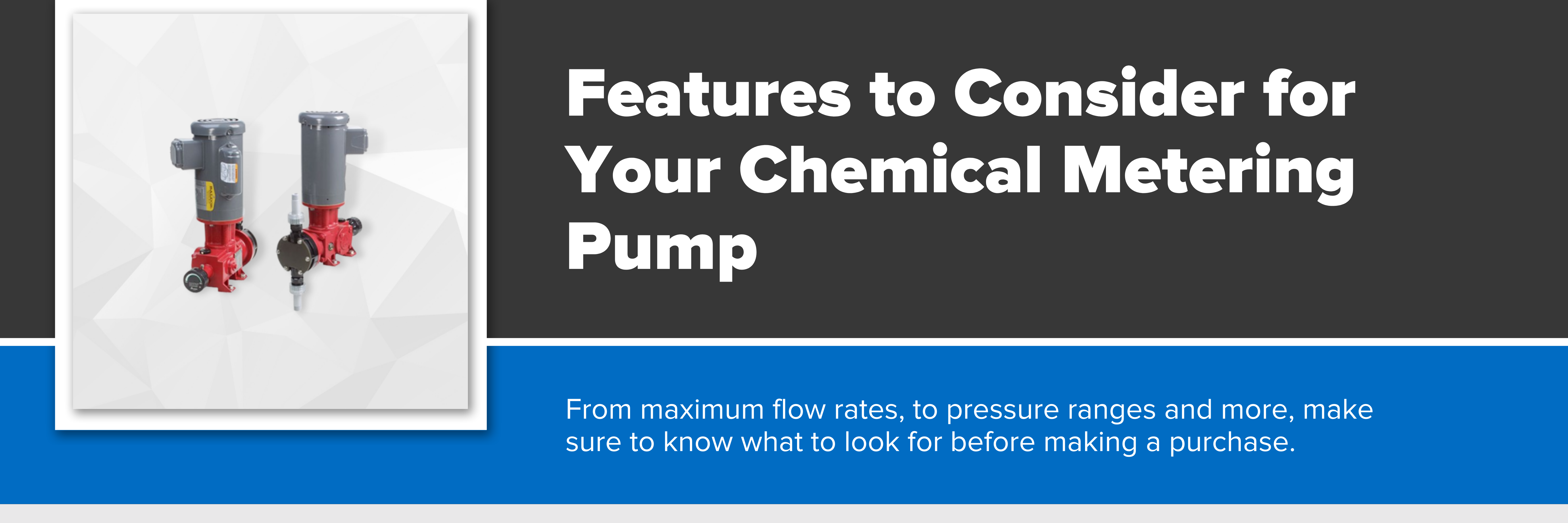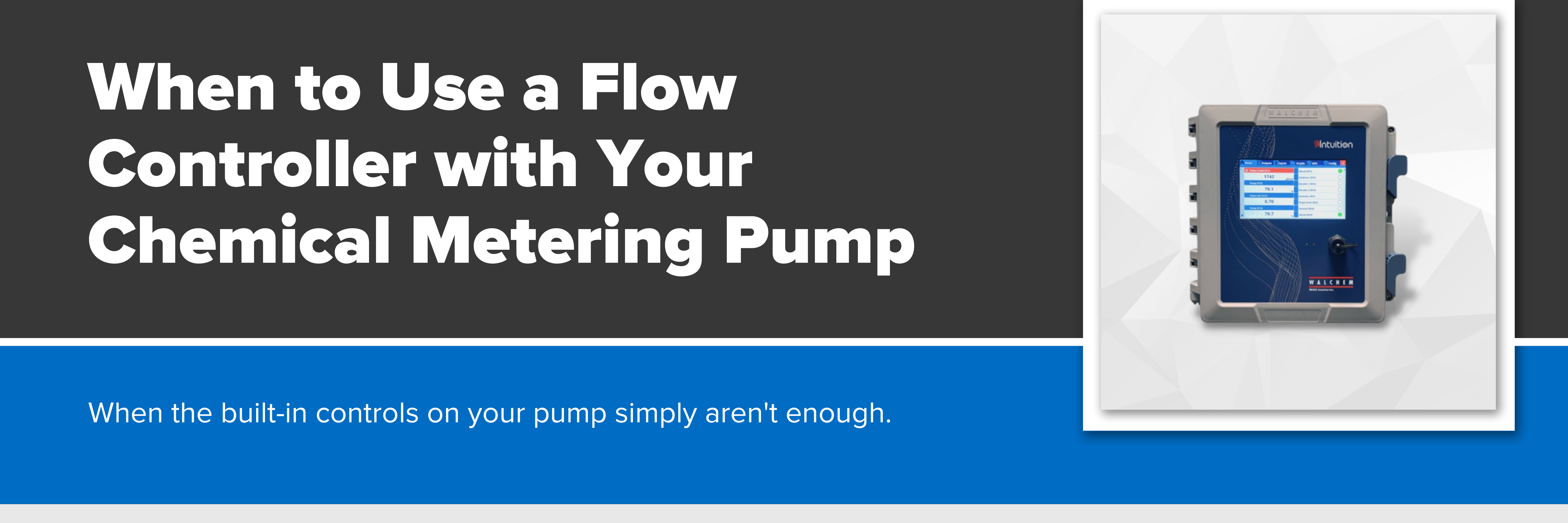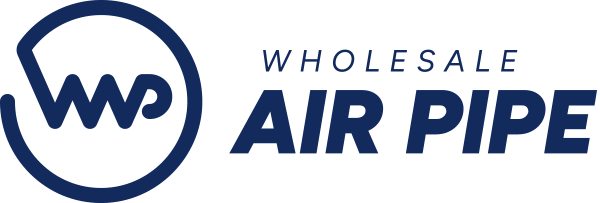Find the Right Chemical Metering Pump: Types, Features & More

What’s the Difference Between a Chemical Metering Pump and a Chemical Dosing Pump?
If you’re wondering what the difference is between a chemical metering pump and a chemical dosing pump, the answer is simpler than you might think. While the names are different, these pumps are both meant to add a wide range of liquids or chemicals into another process. Sometimes it’s the application or location that determines the “right” term. At the end of the day, these terms are all synonymous:
- Chemical injection pump
- Chemical feed pump
- Chemical metering pump
- Chemical dosing pump
- Water treatment metering pump
- Proportioning pump
Keep that in mind as you go forth trying to choose the right metering pump to buy for your application. Now, let’s turn our attention to the important stuff.

Features to Consider for Your Chemical Metering Pump
While the explanation of what a metering pump is seems pretty straightforward, the factors that go into choosing the right metering pump depend much more on the specific application. Maximum flow rate, maximum pressure, supply voltage, the method of control, and material compatibility can vary greatly. Our knowledgeable applications engineers can help you find the right chemical metering pump, but here are a few points to get you started. For consistency, we will be comparing different Walchem Chemical Metering Pumps.

Maximum Flow Rate
Knowing how much chemical solution you need to be introduced to your process in terms of gallons or liters per hour can help narrow down which pump you need. Metering pumps with lower maximum flow rates tend to be simpler to operate and cost less due to the mechanical simplicity compared to other pumps. Some applications like smaller manufacturers need a chemical dosing pump to properly treat their water to meet local guidelines before it leaves their facility. These smaller facilities don’t typically have high demands for their pump. With an output of 3.2 gallons per hour, the Walchem EJ metering pump is an example that suits smaller manufacturers that don’t need high outputs.
On the other hand, some applications like agriculture or water treatment facilities require higher outputs from more high-end metering pumps. Walchem’s LKN Series Metering Pump offers a maximum flow rate of 114 gallons per hour. But, with an increased maximum flow rate comes more stress and wear on the pump. To address this, high-output chemical dosing pumps will often include additional features to improve the longevity of the pump’s performance. The LKN chemical metering pump has roller bearings and oil bath lubrication to ensure durability and wear resistance in continuous operation. For demanding water treatment or greywater processes, a chemical metering pump with high output and robust features is typically the go-to.
Here are some other examples of Walchem chemical dosing pumps and their maximum flow rates:
- Walchem EJ Series Metering Pumps: up to 3.2 gallons per hour.
- Walchem EZ Series Metering Pumps: up to 6.3 gallons per hour.
- Walchem EWN Series Metering Pumps: up to 6.7 gallons per hour.
- Walchem EHE Series Metering Pumps: up to 20 gallons per hour.
- Walchem IX Series Metering Pumps: up to 80 gallons per hour.
- Walchem LKN Series Metering Pumps: up to 114 gallons per hour.

Maximum Pressure Range
While high pressure ranges might intuitively correspond with high flow rates for flow instrumentation, this is not always the case for metering pumps. Take pumping chemicals into a pressurized mainline at a water treatment facility as an example. The flow rate needed for chemical injection is quite low, but the pressure range needed from the water treatment metering pump is quite high. This could be to balance pH, chlorine, or some other water quality parameter to a very precise level. The Walchem EWN Series Metering Pump is an example of a chemical metering pump that is designed specifically for those sorts of applications. Higher pressure ranges also typically require additional features for the stability of the pump. For example, the EWN metering pump has dual bearing support. Both the armature and shaft of the pump are supported with a bearing on each end, which ensures proper axial movement even when the pump operates at fast speeds like 360 strokes per minute. This ensures high-resolution chemical feed in many different applications.
Here are some other examples of Walchem metering pumps and their pressure ranges:
- Walchem EZ Series Metering Pumps: up to 150 PSI.
- Walchem EHE Series Metering Pumps: up to 150 PSI.
- Walchem EJ Series Metering Pumps: up to 175 PSI.
- Walchem LKN Series Metering Pumps: up to 225 PSI.
- Walchem IX Series Metering Pumps: up to 247 PSI.
- Walchem EWN Series Metering Pumps: up to 290 PSI.

Method of Control
As with most flow instrumentation, there is a wide range of controls available to operators depending on what is needed for their application.
- Manual stroke length control: Ideal for simpler applications where the process is very predictable and can handle a “set it and forget it” approach. No flow controller needed.
- Digital input control: A step above “set it and forget it.” Ideal for applications with predictability. The pulse rate can determine the feed rate needed and can be adjusted via a flow controller.
- 4-20mA analog input control: ideal for more demanding applications where automation and control from a central location without having to go to each pump is a high priority. Allows for high-resolution chemical feed while taking advantage of the full range of the pump with a flow controller. Also helpful for municipalities who already need to monitor multiple water quality parameters like pH and TDS.
On top of these methods of control, there are additional features to consider to maximize control of your process.
- Stroke speed - the more strokes per minute a chemical dosing pump is able to perform, the higher the resolution and control of your process.
- Turndown ratio - the higher the turndown ratio, the more control of your process you can have.
- Alarm output - enables quick action to be taken when something goes wrong or a limit is reached.
- Batch control - programmable control within the pump itself over how you batch during the chemical dosing process without needing a controller.
Here are some examples of Walchem metering pumps and their methods of control:
- Walchem EZ Series Metering Pumps: Manual adjustments.
- Walchem EJ Series Metering Pumps: Manual adjustments, digital input.
- Walchem EHE Series Metering Pumps: Digital input, analog input.
- Walchem LKN Series Metering Pumps: Manual adjustments, analog input.
- Walchem IX Series Metering Pumps: Manual adjustments, digital input, analog input, batch control, Profibus options available.
- Walchem EWN Series Metering Pumps: Manual adjustments, digital input, analog input, batch control, external stop, alarm outputs.

Chemical Compatibility
Chemical compatibility is where the focus shifts from what the pump offers to what the application requires. It is critically important that operators know all the variables needed to determine chemical compatibility, such as temperature, concentrations, type of chemical, etc. There are a lot of materials that are available for different chemical metering pumps, but operators need to be sure they are compatible with their process. Factories often provide reference guides, or applications engineers can help as a reference. But, that’s just what those things are: guides and references.

When to Use a Flow Controller with Your Chemical Metering Pump
As we talked about earlier, not every application needs a flow controller for its metering pump. For example, smaller manufacturers that only need a small dose of chemicals added to their water before it is discharged could be able to work with the internal controls of the pump itself. Large volume process water, wastewater, or agricultural applications are where industrial automation and making the most of their metering pump becomes necessary. Here are some scenarios where a flow controller could prove useful:
- Multiple chemical dosing pumps are being used for different chemical injections.
- There is large variability in how much chemical is being injected during the process.
- Precise control and monitoring of chemical injections are needed.
- Having a central location to monitor and control the metering pumps is important.
- The metering pump is in a remote or hazardous location.
Using a flow controller like the Walchem Intuition-9 Series Flow Controller enables more control with features like ethernet or wifi capability for remote access, multiple I/O slots, and robust programming options that metering pumps don’t always have on their own.

Still Need Help? Call an Engineer Today.
If this guide still leaves you wondering what type of industrial instrumentation would work best for your application, our engineers would be happy to help you. Give them a call at 1-800-884-4967. Or, you can shop for a wide range of flow industrial instrumentation from top brands and even configure your product online. We offer free lifetime tech support with every product sold.










